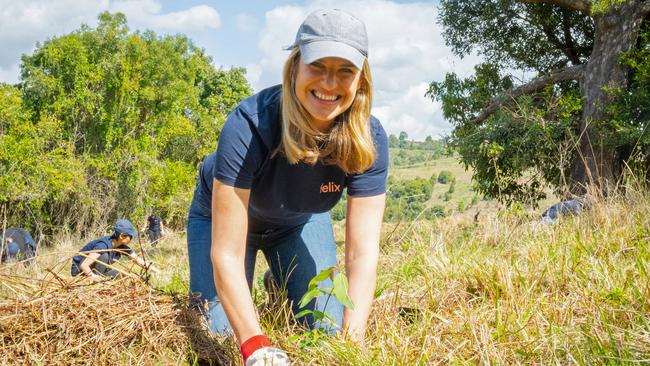Being green isn’t expensive: TPG’s Felix mobile brand will plant a tree for each month you stay
TPG’s low-cost mobile brand Felix doesn’t carry a premium for being environmentally conscious and promises to plant a tree for each month a customer keeps their plan.

TPG Telecom’s low-cost mobile brand, Felix, is expanding into Coles after signing its first retail distribution contract – and it has a novel way to keep customers in a fiercely competitive market.
Each month a customer maintains their Felix plan, the telco plants a tree. Customers can keep track of how many trees Felix plants via an app, even if their loyalty has created an entire forest.
It is Australia’s first telco to use 100 per cent renewable energy and is carbon neutral. Being green is its way to win over customers in a sector notorious for its churn rate, which intensified after Optus’s national outage last November when tens of thousands ditched Australia’s second biggest telco for rivals Telstra and TPG.
For Kelly Beater, head of Felix mobile, it shows that sustainability doesn’t have to be expensive – unlike free range eggs and the smorgasbord of plant-based milks.
Yet, she says ahead of launching into Coles there was still the perception that when a brand spruiks its green credentials, it comes with a hit to customers’ hip pockets.
Ms Beater said about 88 per cent of shoppers were concerned that an environmentally conscious lifestyle meant higher prices, citing a survey of 1000 Australians.
But about 80 per cent of Australians believed it was important to buy greener products, creating a market opportunity if sustainability could be achieved at low cost.
“What we’ve been focused on from the very beginning is this idea of smart value. And we’ve actually designed the Felix business model around how do we leverage the best technologies to deliver the best in class customer experience, but also deliver a low cost model which enables us to both pass cost savings on to our customers,” Ms Beater said.
An example of harnessing tech to drive down costs, and carbon footprints, is eSIMs, which allow a customer to connect to a network without a physical SIM card.
“Compared to a physical SIM, it’s a much lower cost for eSIMs because we’re reducing packaging, we’re reducing the need for delivery but it’s also got a really positive environmental benefit as well,” she said.
“We’ve seen a greater adoption of eSIM among our customers. Over 60 per cent of our customers actually adopt eSIM at the moment. That’s just one example of how we’ve been able to use technology to reduce costs.”
But Felix still faces a challenge. Its research highlights that only 15 per cent of Australians are aware of environmentally friendly mobile phone providers, while 59 per cent are unsure whether their current provider is “sustainable”. This is despite most companies releasing sustainability reports each year, detailing each step they take to enhance their environment, social and governance obligations.
So far, Felix – which offers three mobile plans, ranging from $25-$40 and 25GB-unlimited data a month – has planted 1.6 million trees since it launched in 2020 and is set to lift that number to two million by end of this year.
“This initiative not only contributes to reforestation efforts, combating the effects of climate change, it also has tangible biodiversity and community impacts,” Ms Beater said.
After launching across Coles’ national network, Ms Beater said the brand would seek to expand to other retailers.
“Coles is the first step. Looking forward we are looking at other opportunities to further increase accessibility and awareness of the mobile plans,” she said.
Felix recorded a 12.6 per cent gain in subscriber growth to 842,000 in the year to December 31. This compared with its postpaid subscribers in its flagship Vodafone brand firming 0.6 per cent to 3.35m.
Felix, Lebara and Kogan accounted for more than half of the 175,000 new customers that TPG signed last year. The telco’s overall mobile revenue surged 9.3 per cent to $2.2bn.
It comes as the nation’s third-biggest telco is lifting the average cost of its flagship Vodafone plans by $4 a month.
But chief executive Inaki Berroeta said customers were looking beyond price tags when considering switching telcos, although he cautioned that growth would moderate this year.
“Looking into what is happening in the market, with the cost-of-living pressures, it is normal that people are looking at the different movements around different products,” Mr Berroeta said last month.
“Telecommunications is about 3 per cent of the expenditure of a household. The truth is that a lot of the ARPU (average revenue per user) increase that we see is really due to the fact that the consumption is growing significantly.
“So the price of certain plans have gone up, but the increases of what comes with that plan has also gone up significantly. And that is a response to growing demand for the services that we provide.”




To join the conversation, please log in. Don't have an account? Register
Join the conversation, you are commenting as Logout